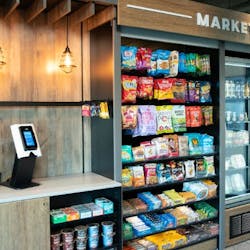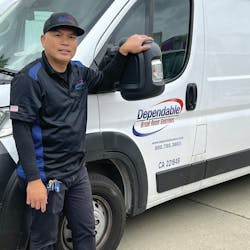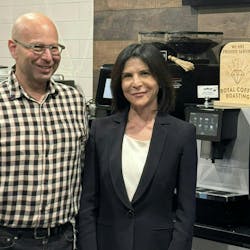What is the best way to compensate an OCS salesperson? Veteran OCS operators offer a variety of answers to this question.
OCS operators traditionally provide incentives to route sales people and pre-write representatives in addition to dedicated sales people. The route sales and pre-write reps are usually compensated more on salary since their roles are more routine.
Operators want to structure their compensation plans to encourage sales people to continually seek more business. Hence, the plan must offer a desirable reward for the effort spent. At the same time, the operator wants the sales effort to return enough revenue to cover all operating costs and contribute profit.
Many operators provide a base salary that will provide a level of security but require additional effort to have a comfortable lifestyle.
The commission is usually based in part on one of the following items: company sales, personal sales, coffee sales, allied product sales, number of new accounts sold, and number of machines placed.
Automatic Merchandiser recently interviewed several veteran operators in different geographic markets on how they compensated sales personnel.
Brent Toevs, a long-time OCS operator who is now a principal at National Coffee Service & Vending (NCS&V), a Lake Worth, Fla.-based vending and office coffee product brokerage, advises OCS operators on payment plans. He recommends a plan that offers commission based on gross profit.
Toevs recommends sales reps receive 50 percent gross profit on new business for a period of three months plus a bonus for exceeding sales targets.
For reaching a $1,125 monthly target, the rep receives $562.50 per month for three months, totaling $1,687.50 for the period.
For each month the goal is surpassed, an additional bonus is paid. For every 10 percent of gross profit achieved above the sales goal, an additional 1 percent commission is paid. Hence, if the sales reach 150 percent of the goal, the rep earns an additional 15 percent in commission. For sales in excess of $562.50 for the 3-month period, the rep will receive an extra $84.30.
If the sales goal is not achieved in any month, then a partial commission can be earned, as shown in the chart on this page. The rep can also earn a bonus for equipment rentals. The bonus is 50 percent of the first month’s rental payment.
GOAL: 2-3 NEW ACCOUNTS PER WEEK
Art Darrow, president of Aramatic Refreshment Services Inc., based in East Syracuse, N.Y., said a dedicated OCS salesperson should be bringing in two to three new accounts per week. In addition, the salesperson is compensated a bonus for all new accounts. Darrow said this can either be a flat fee or a percentage of the first six weeks of gross profit.
John Conti, president of john conti Coffee Co. in Louisville, Ky., pays commission on gross profit in addition to a salary. A typical yearly sales salary is $35,000 to $40,000. A good salesperson earns $20,000 a year in commission and bonus.
Conti pays 6.75 percent commission on gross profit for a year plus a 3 percent bonus based on product category gross profit per quarter, year after year. The salesperson manages the account.
Conti also pays weekly auto allowances for his sales people. He pays $100 a week for a salesperson, plus 32 cents a mile for out of town travel.
For water dispensers, Conti pays the salesperson the full first month rental as commission.
GROSS SALES VERSUS GROSS PROFITS
Conti said some OCS operators pay commission based on gross sales, but he finds it better to pay based on gross profit. This motivates the salesperson to focus on more profitable products, such as better quality coffee. Under this method, Conti said it is not unusual for a salesperson to make $60,000 to $65,000 per year.
A major Northeast operator noted that dedicated sales people receive a base of $15,000 to $25,000, depending on their experience, and paid straight 20 percent commission on the gross profit of all first-year sales and a low single-digit percentage on all subsequent sales. In addition, the sales person can receive bonuses for equipment that is either leased or sold.
The equipment bonuses are common for single-cup brewers. The salesperson receives one full monthly lease payment times the number of years the contract covers. Hence, a monthly lease of $50, which is not uncommon for a single-cup unit, for three years will yield a total $150.
Sales people receive a 20 percent commission on equipment sold. This tends to be the case with high ticket espresso machines that the company does not want to service but the account will want for special uses.
A West Coast operator who did not want his company identified said sales people are paid a base and a commission on exceeding a monthly goal of $2,000 in new business. The salesperson receives 12 percent commission on dollar sales over $2,000 per month. The commission is paid when the bill is invoiced.
They are also paid a $600 quarterly bonus for exceeding $2,000 per month for three months.
Salespeople are paid commission on new business for a full 12 months. By allowing the salesperson to get paid on the account for 12 months, the company motivates them to keep “working” the account. This will result in higher sales than leaving it up to the route driver, the operator noted.
Paying for 12 months also helps reduce turnover in this key area, the operator noted. He said a salesperson will be less likely to want to quit if he or she knows they will lose commission.
In addition to the base salary, sales people receive $500 a month for cellular phone and travel expenses. The geographic region served by this company requires more travel time than in big metropolitan markets.




